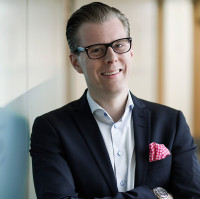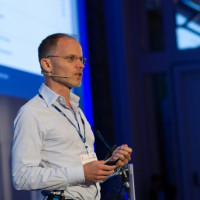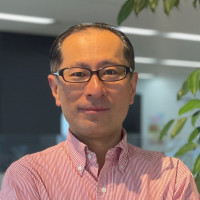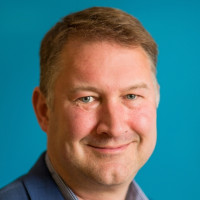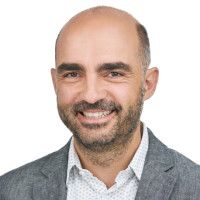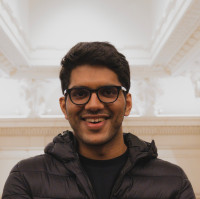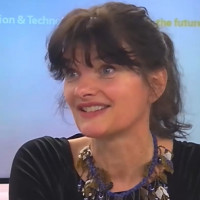What we're gonna do very quickly is dispense with introductions. But Gale Hodges from the open ID foundation is going to give her name and her organizational affiliation and then pass the Baton, restart the end.
Oh, we're gonna start at the other end. Fair enough.
Well, here's a extra phone, Daniel. It's all up to you.
Thank you very much. Can you hear me? Thank you very much, Don. Thank you everyone.
For, for coming. I apologize that this is so late. I know that we are almost at the close of EIC, 2022. A lot of a lot of people traveled here and, and some of our travel schedules did not allow people to come earlier. As most of you might know, it was at last year's EIC, which was about eight months ago that we presented a paper. And at that time it was really just a paper, a paper written by 155 co-authors, but nothing more. And I couldn't be happier than to be here. Someone said, this is a soccer team. We are 11 people here and it is quite an amazing group.
And I'm really proud of every single person sitting here. So we want to start with a quick introduction of who the people are that you see here. So our soccer members are going to introduce themselves. And the first question that I ask, all of you is why global interoperability. Why are you excited about global interoperability? COBA can I start with you?
Well, the introduction first, my name is Yuko. I'm an independent identity expert expert in financial service. Now advising the SSI lab of the European union on distributed. So identity and why? I think it's very important. What we've seen in the past years is always that we're more and better identity schemes, but we need less and interoperable identity schemes on a global scale. That's the only way to do it, right? That's my opinion.
Hey everyone, I'm, I'm Chetty. I volunteer with the ice spirit foundation and your question, Daniel.
I think if, if you sort of zoom out and look at the world we are living in right now, where on one end, it appears to become, to be a lot more fragmented, a lot more divisive, sort of spreading apart. But what's really fascinating as, as we've had discussions over the last few days is as you mentioned, the spirit of cooperation.
And I think as designers of protocols in the various regions that we come from, these protocols can be very powerful if they interconnect, if they allow for interoperability, for individuals in small businesses that are part of that society, both domestically and for a range of the cross border use cases that we discuss. And it really allows us to rather than lock in value. It allows us to open it up to a range of companies that are being built on top private innovators of various kinds. And without that core interoperability, we just creating economies that are stuck in very deep silos.
And I, I don't think that's that what we should be aiming for.
Yeah.
Great. Great. My name is Jon Premble. I work at bank ID auto Sweden.
So for us, I also great honor to be here. I think we, we have been working outta Sweden for the last 20 years, creating schema for that.
And I, for us, it, it is just great to be, we just want to, you know, explore and share. I know how into new ecosystems be part of that. I think for us, it's also truly important about standards moving forward.
You know, we really wanna focus in great, great services and that that also needs standards for, for that. So, so we are a happy part of, of the game family and really proud to be here.
Good morning, son. Good morning. This is ju I'm Judith leaner. I'm the director strategic engagement for the trust over IP foundation. The trust of IP foundation is a collaborative community. It within the Linux foundation, we are a project within the joint development foundation or the JDF, which is the standards organization within Linux foundation.
We have over 400 members, individual and community members working on white papers, specifications, guides for governments and organizations that are trying to create trust frameworks. Our mission really is to create a robust common stack of protocols that interoperate so that we can have a decentralized digital trust that is works at internet scale. And we realize that in order to do that, you have to collaborate.
You know, we're not gonna do it. Any one of these organizations on this panel is not going to do it by themselves. And so that's really the mission that trust over IP has been working on for the last two years.
And we started with 20 founding members and they really realized that it's not technology alone. That is going to have the stack work, that at every layer of the stack governance has to be equally paired. And that's why we have a dual stack with a governance architecture and a technology architecture. And so this is the work we've been working on.
We're already working with Nick down here on governance framework stuff. We are already I've. I've been talking to Gail about how we can work closely inter connect with open ID connect. Our technologist have been looking at O I D C, how does that fit into the stack? So we just think that interoperability has to happen and it can't happen in a silo. We have to do it together. And so we're just so grateful to all of you who are in the room and online, thank you for getting up at what God, all hour, you got up to listen to this because it takes you not only us to get involved.
So that's what we're here to do is get you involved so that we can do this together.
Okay.
Hi, my name is MAA Maita from JCB Fisher is payment scheme like visa and MasterCard, but we also operate a direct Ising business as well. The direct acquiring business. So our business model is very similar to American plus three party scheme with licensee. That's our business model. We have more than 60 years history in the payment industry. And in the early days we were just local scheme. But 40 years ago, we decided to be scheme international scheme by ourselves. But after that decision, we found that it was very tough and in Asia and in Japan, we are so successful.
But in Europe, in us, unfortunately you cannot see JCBS brand log mark. It was because it was too tough. And now we are going to the digital identity. Digital identity is very important for the payment industry as well after grabbing the digital identity, just checking a risk and sending money from a to B that is payment.
So digital identity is the initial step and necessary step. Now we are in a modern world, how we utilize digital identity that is very important. And in digital identity area, we are just in 90 sixties in a payment area.
Everybody started local scheme or regional scheme, but not inter-operable. But back in 1970s, eighties, we found that inter probability was essential and it's necessary. So some payments scheme like visa, MasterCard, American next, and J went to the international scheme. But now do we really start such interoperability by ourselves? Or if there is some local scheme, regional scheme and digital identity area, or we just built interoperability, you delighting the corporation, which is better way we need time. And we need to, that less cost is better.
So we wanna have interoperability among the schemes. Thank you.
Thank you. My name is Peter Castleman. I'm a identity standards architect at Microsoft.
We, we actually believe that there are problems that are way bigger than what can be solved by any one individual or any one company or any one government even. And this is why we believe in standards. Standards gives us way to solve problems that are bigger than ourselves. It's way to help our customers solve problems that are bigger than what they they can do by themselves. Identity is one of those problem areas and, and we are extremely committed to identity standards specifically. And of course we get from that also then interoperability as a result.
I think one of the things that we particularly are interested is how do we make all of these identity schemes that are emerging work together? Our customers increasingly, you know, very, very short notice. They may be operating in one scheme, but they need to collaborate with another scheme.
The pandemic kind of taught us that lesson, right at very short notice, healthcare identity schemes and travel identity schemes had to find ways to work together, but they weren't really designed for it. And we really didn't have good mechanisms. And so it was kind of messy to sort through that.
But the other thing that happens when we start combining these schemes, when we allow these schemes to connect and become interoperable, we unlock tremendous value for our customers. We avoid rework, but we also allow customers to access services much more seamlessly, and we remove barriers to adoption.
And, and this is why we are excited about standards and the interoperability that result from that. Thank you.
Speaker 10 00:11:33 Hello everyone. My name's Katrina Dow and I'm the founder and CEO of Miko. And we focus on enabling our partners, typically banks, financial institutions, telcos government, providing their customers access tools to access control, and exchange their personal data. Why this is really important from our perspective is everything that has been said.
And, and maybe to look at it from sort of an evolutionary and anthropological point of view is that standards are a social contract. There are a way of negotiating, a common understanding of how we will approach things. And we all know that we were so excited with that first ping for web one, that we could connect somebody in wave. And then with the commercial layer that came with the next wave, and then everyone went, oh, internet, sorry. Identity is missing from the internet. And we have all these issues and problems.
And I think we have this small window of possibility that will only be possible through the collaboration of aligned parties to say, before we move into this spacial web, what are the social contracts that we want to lay down?
Speaker 10 00:12:54 What are the cooperative rules? What are the, what's the common framework and language, because we've already seen 20, 30 years of what got us to hear. And I think there is collective wisdom for us to say, before we lay down this brave new spatial world, could we put some governance and infrastructure and common ways in place?
Because to be a digital citizen is to be a global citizen. We don't have physical barriers and boundaries. Children will be born into a digital world where they will be immediately connected through everything, language, education, entertainment, music with every other child. And we have a responsibility to use the things now to make that better. Will we get it right?
You know, I'm sure we won't get everything right, but being mindful of it and starting now, I think could make a huge difference rather than wait till everyone goes, oh, we should have done that. I think this soccer team approach is a good place to start.
Speaker 11 00:14:10 Thank you. So I'm a DDR, a part of Ava uniform, digital trust services, business unit. So AVAs is a global provider of privacy security and identity services, 435 million user across 60 different country protecting your, your devices and, and way the recent acquisition of security, which I'm coming from.
And name, we are stepping in the digital identity wards, and we'll be launching a service to empower end user our end user with their digital life in a form of a digital smart agent that help with authentication identity verifications and, you know, digital engagement with business services, really empowering the, the user be able to do that requires interoperability and collaboration across multiple sector. A user is not a financial services. User only is not a government services user only.
It's a user that interact with business services in government, financial sectors and, and across, and, and the users ask to have one set of tools that the user can trust and use across different services.
Speaker 11 00:15:21 And in fact, you know, we, we at secure key started with building services in Canada based on open standard and availability and collaboration.
The service that was launched couple years ago in, in Canada is the collaboration with government financial service providers, credit organization, telecom operators, working together in the, in putting digital identity verification services that, that works across different sectors. In fact, the it's the first embodiment of a similar initiative led by DIAC called the pan, the pan Canadian trust framework at enabling interoperability, not only technical interoperability, but as well, you know, governance, interoperability across different scheme in Canada.
We have, we have one called me, which is now brought to market by Iraq, but then the provincial government, federal government are issuing as well, their own credential. So interoperability between different skin and different is absolutely key. How do you achieveability is by building your services upon global standard, without standard, it's becoming super hard to enable global interoperability and collaboration between different, different actors.
Speaker 11 00:16:36 So we, we do see, you know, gain initiative as, as another interoperability vehicle at the global scale, like, you know, DIAC is doing in Canada at, at the country level, enabling interoperability between participants. So we, we are a strong believer in, in global standards, strong believer in interoperability. And this is why we are here to empower our user works across sector with their digital life in a seeming less way like they are doing today with payment. They don't think about it when they tap their credit card in a terminal. It all works.
It's based on global standard. It's based on collaboration between the payment scheme to offer a seamless experience to a, to a global user.
Speaker 12 00:17:24 Thank you, DIA.
Hi, I'm Nick mother Shaw. I'm chief identity strategist at the open identity exchange. And the reason we're here is, is simply because this is our vision. Our vision is that all of us can have an identity or identities of our choice that are trusted to prove who we are anywhere around the globe. That's our vision, and to achieve that we collaborate. So we're a member's organization. We're a not-for-profit, we've got 70 plus members at the moment and growing and all of those members share that same vision.
And so when I hear everyone along the, the, the line here talking about collaboration, that's music to my ears, that's what we're here to do. We, we set out a, a guide to trust frameworks, a 30 point plan. If you like, as to how to make trust frameworks, a success, and to how to make them interoperable 30 different elements from the technical through to the, how do you prove people through to how do you service users?
Speaker 12 00:18:23 What do you do when things go wrong? What about liability? What about data protection? How'd you govern all of that.
What are the roles in the ecosystem down to the technical in terms of trust, registries, and standards. So all of those 30 elements, it's a complex conundrum for us to get, right? And that's takes the collaboration to bring all those jigsaw pieces together, to, to craft each piece and make sure they interlock. And that's why we need all of these people here. All of those people who are already involved again, the 154, and all of you to be part of what we're trying to do to achieve that vision of interoperability.
So I think I'm, you know, delighted to be, to be sat here along, along with all of my colleagues, with that common vision, to make this happen, to make interoperability a reality. And the economic benefits of that are gonna be colossal.
Speaker 12 00:19:10 And that's something I'd like to see is quantify as part of the gain initiative.
You know, we got they're in Kinsey report from a few years ago. So we can say country by country, that's a 4 billion country. That's a 7 billion country in terms of the economic benefit of digital identity. What layer of that is interoperability? What layer of economic benefit there's interoperability unlock. And that's something I'd like to see is explore and try and put a number on, because if we put a number on that as a global benefit number, then we show how we can benefit society.
Not just those of us who are privileged enough to easily get an ID, but more importantly, those who we can enable to be global citizens by getting them a digital ID and getting them into the global ecosystem.
Always fun to be last.
So I'll, I'll try and make it fun. When I, I look at this group, I see a combination of United nations and FIFA, right? So I see like each individual literally are pretty much from different countries. There's almost 11 different countries, like 11 different businesses and nonprofit organizations represented. And everyone's pretty darn good at running their own soccer team, right? Making amazing things happen in their respective jurisdiction, developing their standards, making stuff happen right in the real world. And now we're all collectively recognized.
We're at that tipping point where it's moving into international operability is the next natural step of what we have to do. And it's inevitably critical in order to serve the people in our respective countries and the members of our, our respective organizations. This is that moment. Right? And so like the UN, we are fundamentally trying to serve people.
There are good guys and they're bad guys. I think we look at ourselves as the good guys, right? And there's unfortunately way too many, incredibly empowered and coordinated bad guys out there. And where is our Alliance to fight them?
This is it. This is one of those opportunities. This is the opportunity to lean in and create that Goodwill that we're not against each other. We are for each other. And we are against people who are trying to defraud, trying to invade the privacy of trying to manipulate our democracies. Right. And if we can't come together to solve these problems, they will continue to harm our communities, harm. Our families harm us as individuals, right? So it's an imperative that we do this, it's a calling for our trade to solve this problem. And so it gives me great hope, right?
That we can come together, hopefully be very productive in the way we do that. And not some of the governance structures we've seen across international organizations, but we have that true focus, right. That it's really about the people and creating the amazing protocols, the amazing governance frameworks and not tripping over the complexity in the service of that mission. Does that make sense?
Now we know why soccer games take 90 minutes and not just 60
Speaker 13 00:22:18 Minutes.
You know, this is, this is a great moment.
If I could have a dollar, every time people told me that it would not be possible to get the open ID foundation and trust over IP foundation on the same panel, we would not need to look for funding. And if I could have another dollar every time someone said, well, you know, this is all great, nice little paper, but you are not going to get a serious company to be interested in this.
You know, we would definitely not need to get funding.
This is, this is really something that took us a long time. And a lot of effort. We have alt friends on this panel. We have new friends on this panel. We have some of my early role models.
You know, when we, when we got started here in Germany, bank ID was always the company that we would mention to our banks here in Germany would say, look what they're doing in Sweden. You know, maybe we can do something like that. And when we looked across the pond, it was really the India stack. It was looking at what India is creating with the digital comments, for the empowerment of citizens, with ATAR, with, with U P the universal payment interface with, with now, with, with DEPA, what you're doing in Canada, what you're doing in Japan, what you're doing around the world is amazing.
And I think the opportunity to get that, to bring that together and to really believe in a decentralized future with different architectures and different companies and different visions and different people and different ideals, but a shared ethos of global interoperability is really a personal cause. It's something that I find incredibly important. So I have one more question to all of you, which is why gain, why not just do it at trust of IP, or just do it at open ID foundation? Why are we working together? Some of you alluded to that.
So if you feel you've said it already feel free to just skip. And you know why now Katrina, I have a different question for you, which is why bread Pitt, but to all the other people here, the question is why, why gain? Why now?
Well, the easy question is why now? I think I've been feeling it since the past three, four years that everything was leading up to this sort of solution and why again, well, that's, that's everyone has already done, I think, stated their own reason. I think it, it, it should be an overarching consortium. It shouldn't be led or owned by one party because it, that the real cooperation is if you do it together as equal parties. And that's why I think this is the construction.
Why, again, I think it's, it's quite simple. I, I like the people it's, it's, it's very clear that amongst this group, given our diversity, there's still a shared sense of purpose towards the future. We're trying to build a lot of which is, is even more multiple as you mentioned Daniels. So I think that's what it comes down to at the end of the day. And in terms of urgency, I think it's extremely clear that we are at a crisis crisis point on numerous levels. And therefore now is the time to really rebuild the future that we want.
And if we don't, it will be filled up with solutions from the bad guys. So sort of as a, as a resistance, we, we need to get our act together and do that in a timely manner and, and build,
Yeah, I think that was greatly put, I think in any business it's it's about the people. Yeah. So again for us, I mean, why now?
I think, yeah, we, we are in, in great need of standardizing and, and coming sort of becoming a more mature businesses. So I think that is, is crucial for us.
So yeah, I think, and then again, I think it is a lot of in the people and Daniel, you, you are really done an amazing job and, and sort of pulling us and pushing us all the time. And I think that that is it's what's needed, right? It's it's the people,
Well, anyone knows that trust over IP is about creating a decentralized layer for digital trust, but centralization isn't gonna go away in the enterprise. Right?
So we're up to creating what I think the mission of everyone at this table is, which is to create a trust layer that is good, not only for the individual, that it is easy to use, that it is privacy enhancing, but also that it is good for the enterprise and that every different enterprise has different needs. And for that, you have to have a stack of protocols, not just one protocol. And so that's why our reference architecture is working toward finding the minimum viable stack, similar to tr IP, you know, IP isn't the whole internet, right?
But there's an IP address and that's there right there where it's the waste. If anyone knows the hour graph glass, we're creating the neck, the trust layer, what is that minimum viable that allows the layers in the protocols above to do what they need to do and the layers below to do what they need to do.
So the enterprise can decide what they need to do. And so that's who trust over IP is. And so we cannot do it without open ID. We've been talking for months with OIS on how to articulate their framework in a way that is friendly to self-sovereign identity.
And if we work together, we're all going to get what we want, right. So it's really been the mission of trust over IP since we started and why gain gain is not attempting to create another organization that is not the vision, right? So gain is just trying to get all of the players going on the field in the same direction so we can meet the goal. So I'll close with saying, go team.
Hi, in my case, slightly different from Europe or other part of the world in Japan, we do not have clear national ID system, or there is no requirement of the such digital identity in Europe or in India, you have strong backup or push from government, but we don't have it. And as you can imagine, Japanese are so shy anding to say something clear. So everybody want to follow. If there is a firm direction, there government is same.
And, but I believe digital identity is very important and essential for coming 10, 20 years to make it happen, to push government from our site. I wanna utilize gain activity and, or it's should be different. But in our case gain first, there is direction of standardization or clear picture of the interability or future world I will utilize that are intuitive to make it happen in Japan or neighboring countries in Asia. Thank you.
Thank you. So first why this problem is just too big to be solved in one place.
And as a result, finding ways in which we can collaborate and figure out how to do it together, identity is also a diverse problem and it's being solved in diverse ways. And it has to be right. It has it's, it reflects our local cultures, our specific industries and specific needs of users. And so we cannot just do it in one way, but we need a way to do it so that it is still interoperable, that it can be leveraged and that we can bring that together.
And, and the, and also, I think it's really important that it doesn't get concentrated in one place. Identity is too important to leave in the hands of, of just one or two or a few. Right? And that's why we see such a diversity and identity. I think the other piece around identity that, that, you know, the question about why now, because the need is there. We're beginning to see it.
I mean, the pandemic gave us examples, but there are many more, you know, I think figuring out the rules of the road, figuring out how we do this. What's the frameworks within which we inter-operate between trust frameworks. How do we weave these trust frameworks? We need to start now and we need to figure out how we're gonna weave this trust fabric and this trust framework in, into each other. Thank you.
Speaker 10 00:32:25 Thank you. So I have a different exam question. I wish it was Brad Pritt particularly the fight club version, but it was actually Tom cruise. Sorry about that.
That's all right. Just very quickly for anyone that remembers the film minority reports, that that film completely changed my life. And if we remember, there's like 90 seconds of that film that we should be reminding ourselves of all of the time, because everything we've discussed here is in that 90 seconds of somebody that has lost any agency who is running through a mall, there's no consent. There's biometric recognition. There's no progressive disclosure. There's no opt in. There's no opt out.
And what is happening is that you have there's weaponized biometric identity system that is tracking absolutely everything. And I came out of the cinema and thought, wow, is that the future? That is just so dystopian and Jerron Laia who at the time was the technical consultant on all of the special effects.
Speaker 10 00:33:33 He was hoping to scare everybody through that technology, but everyone thought that technology was so cool. And that brings me to the point of why gain it's the fast far.
You know, if you wanna go fast, you go on your own. And I that's. One of the problems right now is our technology is going so fast, amazing things. And our regulators can't keep up our governments, can't keep up. And if you want to go fast, you go alone. But if you want to go far, you have to go together. You have to, you have to look at who you can bring along how you can take care of.
And I think if we don't want that dystopian future, where everything about our physical and digital selves is weaponized in some way, then we have to find a way to be able to do this collectively and fast is good.
Speaker 10 00:34:29 Cause you don't have consensus. You don't have to sit down and chat to each other and work it out. And I think this, and you think that, but that doesn't ultimately work in the way it does. And I think why gain, because organically people heard an idea and signed on with their time and effort.
And I think it comes back to people, peop some, you know, a group of people said, Hey, could you have a look at this draft? Or what do you think of this? Or have you heard of this? And all of a sudden an idea became a soccer team, which became a global team. And I think that's the power of people. So if we wanna go far, I think we should use the things that exist and, and we should do it with the people that are like minded and motivated. Yeah.
Speaker 11 00:35:24 Yeah. So I think I'd like to build as well on, on, on people.
So we, we are, as we are people first and the way we come together is, is about the people. When I look around the table, we have people representing organization, people representing, you know, market financial market, governments, people representing, you know, foundation or standardization, how to make the great standard, how to gather people together. I've been working on identity for a long time. So I think it's all about the people who understand what is at stake to create global standard.
What is at stake to create something that works for identity identity cannot be solved by one single entity. You know, the, the network we, we have enabled in Canada, you know, the geography is based on that. No one can solve identity on its own. The banks cannot do it alone.
Speaker 11 00:36:13 The government cannot do it alone. The telco cannot do it owns about bringing people together to help citizen and consumer prove who they are. So first of all, it's the people coming together, us to solve a very complex problem that requires a collaboration.
I think the second question is why now? So I will have almost asked why not yesterday, because you know, for God's sake, we were walking on that and we needed. But I think my answer to why not next yesterday is we needed new standard to be mature. We needed new thinking to be mature and, you know, identity has to be distributed. So this self-sovereign very fiber credential, distributed model, distributed operation as well, not centralized operation where you can end up having a single point of trust or single point of failure.
So I think everything had to mature together, the standard, new technology, new way of working in a distributing on environment as finally mature over the year.
Speaker 11 00:37:13 The second point, I think the, the pandemic has absolutely accelerated the need for remote interaction.
You know, so this is why we have seen so much innovation over the past couple years on around identity and how to deal with that because the pandemic is, is we have no other way to do it. We are to interact with businesses being, being remote. So it's like all the star lining togethers technology, being more mature, standard, being mature, new technology and new standard coming together to solve for distributed identity schema. And I think people around the table willing to collaborate for, for creating a bigger pie.
You know, I want to be part of a bigger pie, not owning something smaller. So I think this is why, why gain? I think Johnny put it, put it, you know, rightly yesterday on our panel, its we don't need more organization.
Speaker 11 00:38:14 We need more bridges. So how do we make organization working together? How do we collaborate? How do we enable, you know, interaction with organizations? So I see gain or the soccer team as a way to enable bridges. So we could have different point of view on how to enable that. But the last thing we want is another organization.
We want to have collaboration between organization that has been there for a while and are expert in their domain. So how do we create the bridges between organization, either foundation or corporation or end user, you know, the end user, we cannot be left, left aside, you know, the end user, the people at the centers, you know, we want to make sure we empower the end user interacting with our digital idea.
Speaker 12 00:39:01 And I think I'd like to expand on the, on the why now element of this, as did said, we now have such a standard sort position in the market.
If we think let's go back seven years, 2015, could we have done this? Then we had little or no digital IDs in markets around the world. We now have scale in certain areas we've got in Canada, we've got five and systems. India's got, got millions, billions of people involved in digital ID. We're at a point where we've got consideration an experience doing things locally. That means we can now think about how do we do things globally.
You know, five years ago, we weren't talking about distributed, decentralized we, everything was central. So we now have a model that works and that works for the people of the world. If we don't do it now and we wait seven years to 2030 ish, we will be too late, too late.
Speaker 12 00:39:59 Too many things will have happened. Too many standards would, will have been created. We don't want any more standards we want, we need less countries would've gone and, and done things in proprietary ways. Achieving interoperability on a global basis will be impossible.
It will have to be a massive reset to achieve it. And that's why now we're in that perfect moment. And I think so like the pandemic does bring these things to the fore and it brings I for me anyway, it's brought my, my thoughts around globalization as a planet we stopped and it made us realize we're one planet more than ever before.
I think, and we have this opportunity now and now only to get this right across the globe. So timing is everything in this as it is in football. So coming together now is the right thing to do.
So a couple, couple quick examples that just terrify me reading in the news recently of roadblocks, a common children's game has people S and M having sex often corners in the same platform as children. Right?
Absolutely terrifying to think that we can't create safe spaces digitally for our children and that the smartest companies in the world can't yet tackle a problem like that to allow for those safe spaces. I think of my grandmother who had a pacemaker, how on earth are we enabling biotech and other IOT devices? So that the person who has that device in their body has an appropriate type of, of control that it's really the doctor who's able to instruct it, that it's really authentically the manufacturer and that the chip inside of it that's driving.
It is also a part of the same solid supply chain all the way along time.
What about the code that got pushed by an individual developer? Do you know who that is? I was hearing from rod Boothby, who co-founded NPM downloading of packets. You have millions of compromised packets being up, uploaded into platforms.
You know, the open ID foundation, open source development, NPM open source, get hub repositories. There's a wonderful place for anonymity. And then there's a completely terrifying place for anonymity where that gift to society is used as a way to perpetrate crimes at incredible scale, whether for fun off the side of a desk, by a kid in a, in a, you know, in his room or by a rogue nation state actor.
And there are so many of these examples that make it vital from an open ID foundation perspective, our job is just to provide a safe space, to have these conversations, to create the standards that underpin it, not just what some people know the open ID foundation for, which is social logins and the role of large digital platforms that have used those for single sign on, but far, far more right to enable enterprise access to cloud services.
To enable those I T interfaces, which Andre was talking about in a, in a parallel session, how you enable IOT devices for health, for the sharing of medical records in the us, the UK and in Norway, as well as open banking and truly enabling open data, right? What GDPR and, and CCPA or seeking to achieve. And I heard recently in, in India as well, following a similar principle of, of user user-centric consent.
So with, we seek to create those safe spaces where you can have the working groups to create those standards, not just standards we control with some sort of boundary around them, but also the interfaces with other standards, which are seeking to CA you know, solve parallel problems. We do it together and we have the smart brain sitting in both of our communities to, to work on them. We also seek to have the community group and the gain community group is a safe space for people to come and test their implementations.
Thanks to the great work of Torsten LTA and mark Hayne and Joseph Heon.
And I'm gonna forget a couple here, the five co-chairs of the, the, the community group it's come bring your implementation tested across borders. Several of you are already part of that or are planning to be part of it. I haven't even kept track of how many entities are. I think there's at least 22 different entities participating in that proof of concept to really prove out the standards, right. And to make sure that it's harmonized with the, the work that Nick is doing on the governance framework and the mapping, cuz they have to sit side by side, as Judith was saying, you know, earlier on.
So we are not puppeteering any of this. We are collectively in the service of this mission.
Thank you very much. I've learned my lesson. I'll stick to DIDs and to open ID connect for identity assurance in the future and talk less about movie stars, Don called this the, the super panel. And I think a few of the people here really are, you know, they are superheroes and you are superheroes today. You've been superheroes yesterday, but I think in the world that is an end danger of drifting apart.
The greatest superpower we all need is our ability to come together and our ability to build bridges, to work together, to find common causes. And, and this is why, you know, we, we had a discussion yesterday at dinner over work life balance. And I said that I don't understand the concept of work life balance because this is my, my work. And it's very much part of my life and of what I am excited about and what I'm passionate about. And I think this is really an amazing opportunity and I, I want to plug averse. I hope this is okay to do at EIC.
I promise to plug EIC at inverse as well, but stay tuned. They're going to be more details. You're going to hear more about gain. This is just the tip of the iceberg. This is just the very beginning of what we're doing and I couldn't be more excited for what's to come. So I hope you have questions either here in the room or, or online.
I'm the water boy for the soccer team here. And I want to give a heads up particularly to the folks online. We've got several hundred people online that are interested, perhaps in asking a question as well as people here in the audience.
So do I have any audience members? Why am I not surprised that Kalia is the first to make a comment?
Speaker 17 00:46:33 This is great to see. I think one is, I think it's important to remember, we're not talking about video codex. This is more substantive and the details of the tech actually matter. And as a person who started out non-technical 20 years ago and has progressively gotten down, it's like those, they matter. So I hope that we don't just like brush over them and like spend the time in that space. And I think this is great.
And I don't see civil society at our tables and I'm really concerned if we don't invite them in early, then we won't have their voices and this will have much harder time succeeding. I'm happy to work with folks to identify potential civil society groups. So maybe you can jazz hands if you're into civil society, participating more.
Thank you very much Kalia. And you keep us honest throughout the years. And in multiple venues, you may here I'm,
I'm not here officially speaking for the state of California or for, for other governments.
I've worked in partner with partnership over in the past, but I couldn't agree more, you know, Lia on the importance to collaborate directly with government as part of this. And many of us have discussed how government has an outsized role in the identity sphere, which they don't have in other parts, other, other sectors. So they are both the regulator as well as the consumer of identity credentials, but crucially the issuer of identity credentials.
And I think Andre Durant up on the stage earlier today from, from CEO of ping, rightly pointed out, that's a kind of very important foundation block to enable ask the question of a large number of use cases, especially regulated use cases. So couldn't agree more Kalia, the importance to engage government, but also the rest of civil society.
Right? So if one were to think of privacy advocates, for example, I think all of us want to ensure that there's user based constraint and there's viable privacy solutions. And we do need to have those thought leaders part of the conversation.
And I'm sure there'll be other stakeholders like the under the underserved in society, right? We don't have Africa representation very well here on the map or Latin American representation, very well here on the map, much less other disenfranchised communities. So I think there's a huge opportunity to, to bring them into this, this effort.
And I'll just add to that and, you know, trust over IP, we have a human experience working group and when it first started up, I'll have to be honest from a technical perspective, I was very excited that we were gonna start to work on a, a unified UX, you know, experience.
And that group is really all about listening to the underserved and making sure one of the, one of the task force in that group is called well, we started to call it SSI harms, and we decided we shouldn't do that. So they called it the good, the bad and the ugly.
And it's a safe space to talk about all the things that we are creating. And we look at the good we're creating. Let's get these smart minds in the room at the same time going, what are the unintentional harms and what groups might we be affecting with unintentional harms? So there's a definite need to have that conversation. And so I'll just invite, I see that there were a hundred and some odd people online. So to the online people, all of our meetings at trust over IP are open to the public. There is a low barrier of entries.
So if you wanna join trust over IP, there is a collaborative joining for free. We don't have to do that cause we wanted everybody involved. But if you wanna come to one of the expert series that is at the human experience working group, we have speakers come in on different topics all the time. Same thing in the ecosystem, Foundry working group. We have experts come and talk about things because we want to not be necessarily the place where we're creating standards and telling everybody how to do it.
We wanna be the place where people can come together and listen and learn perhaps to something that you totally disagreed with before. But that light bulb goes on that makes the solution better. And so thank you for Kalia to being always the person who keeps us not just on the straight direction, but as you said, the, the path to of collaboration that gets us to a better destination.
One more word, maybe about the invitations to me, the beauty about of gain or one of the beauties is that there is not even anyone official who can extend an invitation to gain gain is a collaboration of all of us here. And anyone hearing the audience, anyone online, anyone who is hearing about gain to participate, participate by joining the conversation, joining trust over IP, joining IX, joining the open ID foundation. Joining I spirit working with us. If you are a government, you are a standardization organization.
If you're just someone who's excited about what we're doing, you know, make yourself heard and be part of what we're trying to do. You're all welcome. You're all invited. And I very much hope that everyone here is not waiting and asking us to invite, but rather to come join us and to invite people in organizations you think should be part of the conversation.
Speaker 18 00:52:22 I wanted to say something to missus. You were saying, we should not gain. We should make the pie bigger. Maybe it's only a PHY philosophical point.
But what I think is is if everybody of us only would put one finger into the river of gold, instead of putting two hands inside to grab it all, there would be enough for all of us. And I think we, in this technical technologic technologic environment, we have a responsibility to give abilities to the people who have not those possibilities to make their life better. You were saying, Africa is not here, Latin America. There are good reasons why they are not here because we don't care enough for them. That's my opinion. I wanted to say that.
And I'm happy to be here to able to say it,
Thank you. If I may, I'll take the moderator's prerogative. And as Daniel said, there's no one person or one organization, but we do have one of two midwives of game. And I'm gonna give the phone or the opportunity for one of the two midwives of game who introduced the concept some years ago, some years, some months ago to make some final remarks.
Speaker 18 00:53:40 Still the final remarks
Might have suggest that you come up here because we have a hundred to plus people online and they can't see you.
So come to the
Speaker 18 00:53:48 Front place. Oh, so
700,
Speaker 18 00:53:50 You have a hundred. That's a lot.
So, so for the 700 people online,
Speaker 18 00:53:55 All, I'm not, Samore the chairman of 90 foundation, as well as sharing civil society group in Japan as well. Right. And I've got many hearts, some standing in government as well, but you know, so I completely agree with S in a comment that we need to involve civil society, as well as, you know, your comment about Africa and or Latin America or those things because grew up in Africa. Right?
So, and I relate very much to their problems and we shouldn't be just looking at, you know, those advanced, rich places only, we need to be able to take care of those underprivileged peoples, right? And there are people who have no support from their government and self suffering things should be able to serve them. Right. So we must not forget about these things. It's really important. It's UN SDG goals, 16, nine, right? Give legal identity, right? Yeah. To everybody by 2030. And we should aim at it.
I always say that, you know, you know, we tend to think that the good guys think that this is my way of doing this is I'm the hero. And, you know, we tend to fight each other among the heroes while the bad guys positively collaborates together. Right.
Speaker 18 00:55:43 If we don't unite, we have no chance. Yeah. And we can't wait anymore. We need to execute it now. So let's do it, you know, put our thinking into action. So that's my message
Here, here.
So I, I think our next page, if we can progress at one page, had the call to action. So for the 700 people that are online wondering, okay, sounds great. What do I actually do? We invite you to, to get involved through the interoperability working group, Nick mother Shaw's organization, if you're particularly interested in the governance topics, if you're particularly interested in the interoperability proof of concept testing, you can email gain POC O idf.org. But these are just a couple of places.
I think as other organizations come in and become more formally involved, we're gonna have other safe spaces to continue these conversations.
I was just about to say, I very much hope that there is going to be a gain at open trust very soon. So stay tuned. This is not an exclusive club. The idea really is that standardization organizations are working together.
And then, you know, individuals and companies are joining and the more email addresses we have here, and maybe eventually there was a universal inbox that will just go to all of them. But the more email addresses here, the better we can't wait to work with. All of you,
I should add a third call to action.
Oh, I'm sorry. A third call to action. I have the job of coordinating the five initial nonprofit standards organizations that have been supporting the gain initiative since its beginning, the open ID foundation, the OOI the international Institute of finance, the cloud signature consortium and the global legal entity identifier foundation. So this is an invitation for other organizations in the standards world that are nonprofits that would like to join the gain forum that you two are welcome to add organizational support and sponsorship to the efforts that we talk about.
We meet on a quarterly basis and our ideas to better support these multiple initiatives that are growing organically in these communities and others. I also forgot to introduce myself. My name's Martin Kuppinger
And I actually, well, I saw York, you getting for the door and I just wanted to make a special thank you to KuppingerCole who, who have been incubating the gain initiative in several ways, not only supporting the conversation here at this conference prior in Munich, but has also been providing something that also is critical, which is an expert objective analysis of game.
Keeping us honest, asking for the success metrics in timing and traction. And I think that that role that KuppingerCole and other KuppingerCole and other Analyst provide is part of a system of making sure that we are responsive not only to each other, but to the critical analysis of the expertise of Analyst. Like KuppingerCole. So thanks to them for allowing the flexibility of soccer team to assemble and for supporting us in future endeavors, with gain by some market research that we hope to do on a collaborative basis. Yeah.
So
Daniel, about that, that flexibility, we, we all Y and apology, and I hope Y I'm not sure if you hear Martin, if you can communicate it, we've hijacked his panel. I hope it was worth it. Sorry. We will try to behave at next year's EIC if we're invited
And I, for those of you that are, we probably won't behave next year. So Daniel final words go to you and then we're going reassemble in the main hall for some closing comments,
Actually final words go to yo COBA because when, when we met here at EIC, I said it was, you know, it was a P that we had to wait until the end of EIC.
And I think you had something really beautiful to say,
Well, I think this is the best way to end a large Congress like this, about cloud and identity, because this is really what we need and it's happening here and now, and we're all here and I really get these vibes. So it's the best way to end an identity Congress like EIC today. And that makes me really happy.


















































